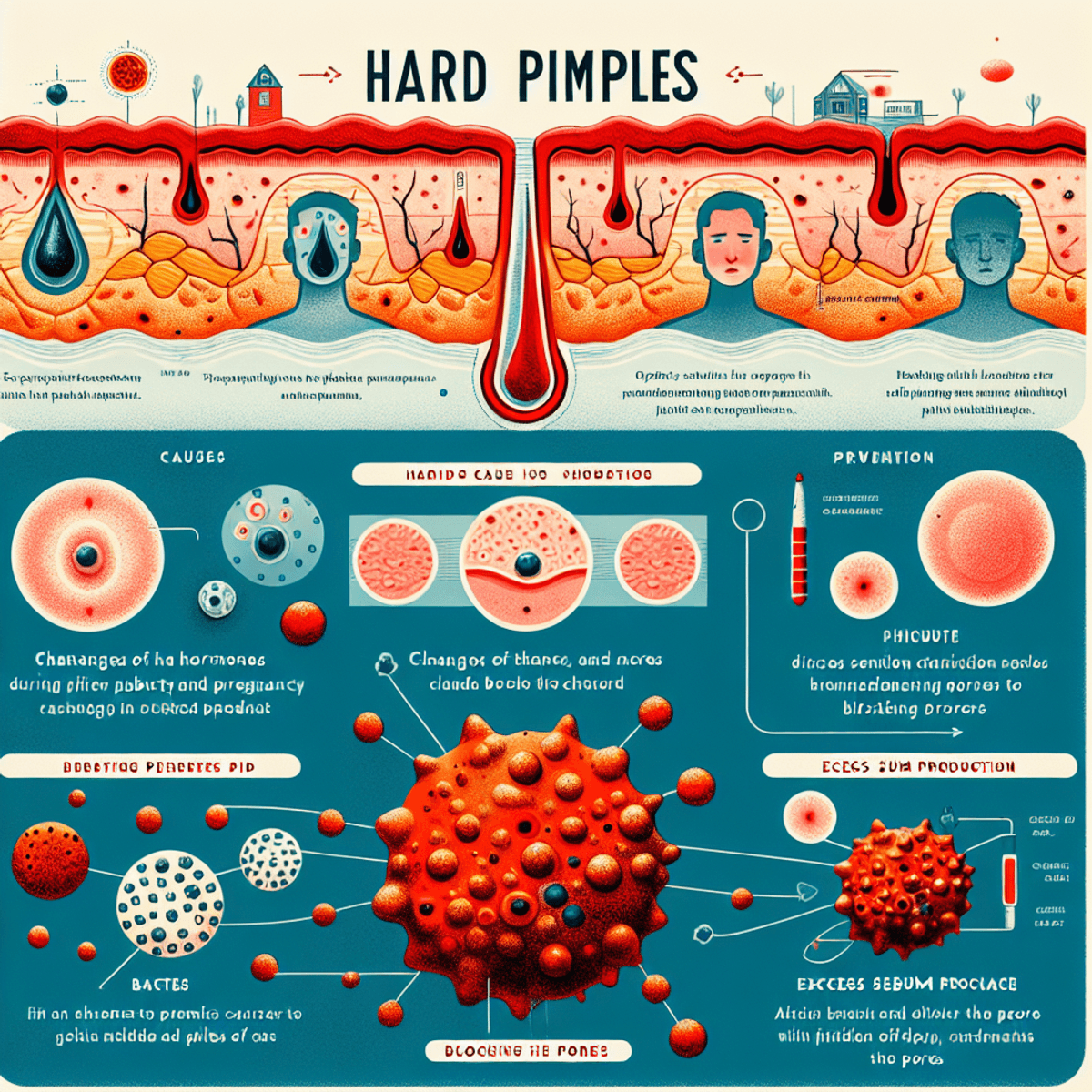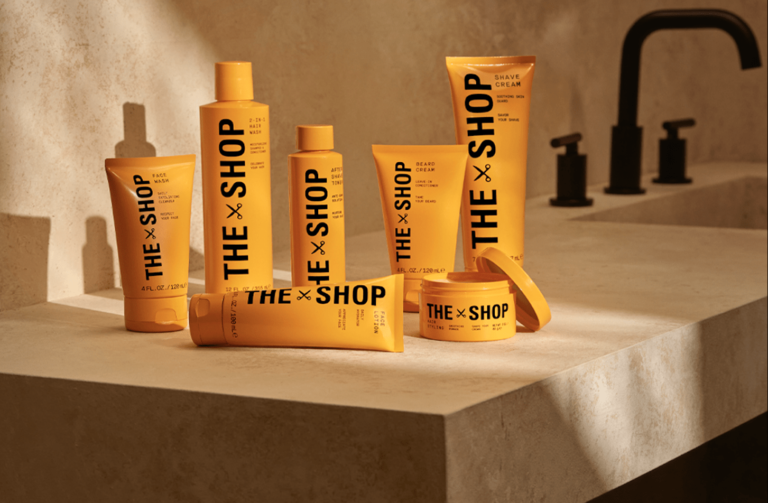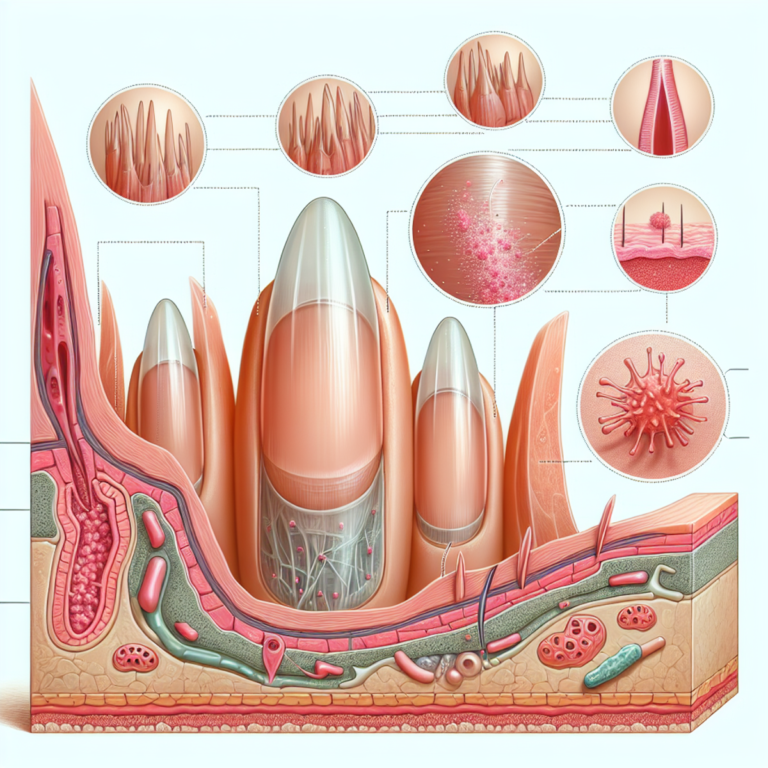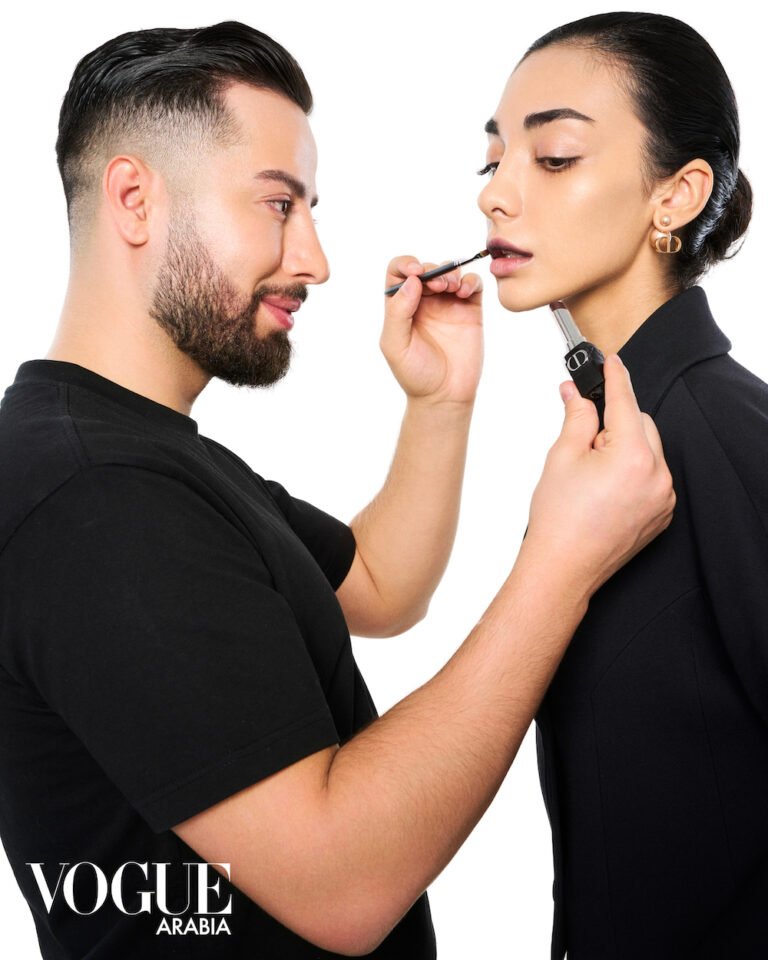Hard pimples: Treatment, prevention, and causes

Introduction
Understanding hard pimples—often referred to as nodular acne—is crucial for effective treatment and prevention. Hard pimples are characterized by painful, hard lumps beneath the skin’s surface. These lesions are more severe than typical acne and can be long-lasting, often presenting as red bumps on the skin.
Why It’s Important to Understand Treatment and Prevention
- Treatment: Knowing how to effectively treat hard pimples can minimize discomfort and prevent scarring.
- Prevention: Implementing preventative measures can reduce the frequency and severity of breakouts, leading to healthier skin.
Quick Look at What Causes Them and How They Look
The main reasons behind hard pimples include:
- Too much oil production: When your skin produces too much oil, it can block your pores.
- Changes in hormones: Going through puberty, being pregnant, or other shifts in hormones can lead to breakouts.
- Infection from bacteria: When bacteria get into blocked pores, it can make the swelling worse.
Understanding these aspects aids in managing and mitigating the impact of hard pimples.
Understanding Hard Pimples
Causes of Hard Pimples
Hard pimples, also known as nodular acne, are a severe form of acne characterized by painful lumps beneath the skin’s surface. Understanding the causes of hard pimples can help in devising effective treatment strategies and preventive measures.
Excess Sebum Production and Its Role in Pore Blockage
One of the primary causes of hard pimples is excess sebum production. Sebum is an oily substance produced by the sebaceous glands to keep your skin lubricated. When these glands produce too much sebum, it can mix with dead skin cells and clog hair follicles. This blockage forms an ideal environment for bacteria to thrive, leading to inflammation and the formation of hard pimples.
Key points:
- Overactive sebaceous glands increase oil production.
- Excess oil combines with dead skin cells, creating blockages.
- Bacterial growth in blocked pores results in inflammation.
Impact of Hormonal Changes on Acne Development
Hormonal fluctuations play a significant role in the development of hard pimples. During puberty, pregnancy, or menstrual cycles, hormone levels fluctuate dramatically, increasing sebum production.
Examples:
- Increased androgen levels stimulate sebaceous glands during puberty.
- Hormonal changes during pregnancy can exacerbate acne symptoms.
- Hormonal spikes before menstruation often lead to breakouts.
These hormonal changes trigger excess sebum production, contributing to pore blockages and subsequent acne formation.
The Role of Bacteria in Exacerbating Hard Pimples
Propionibacterium acnes (P. acnes) is a type of bacteria naturally present on the skin. While generally harmless, it can exacerbate hard pimples when trapped inside clogged pores. The bacteria feed on sebum, producing substances that irritate the pore lining and cause inflammation.
Important aspects:
- P. acnes proliferates in oil-rich environments.
- The body’s immune response to bacterial infection leads to redness and swelling.
- Persistent bacterial presence can result in hard, painful nodules beneath the skin.
Understanding these underlying causes is crucial for effective treatment and prevention strategies for hard pimples. Addressing factors such as excess sebum production, hormonal fluctuations, and bacterial infections can significantly reduce the occurrence and severity of these painful lesions.
Factors Making Breakouts Worse
Recognizing and understanding the factors that make hard pimples worse can help in effective management and prevention. Here are some key elements that contribute to the worsening of breakouts:
Stress and Acne Flare-Ups
Stress is a significant factor that can worsen acne conditions, including hard pimples. When you’re stressed, your body releases hormones such as cortisol, which can increase oil production in the skin, leading to clogged pores and breakouts. Practicing stress management techniques like meditation, exercise, and adequate sleep can help mitigate this impact.
Skincare Products and Skin Health
Certain skincare products can either benefit or harm your skin health. Products containing harsh chemicals or heavy oils may clog pores, aggravating acne conditions. Opt for non-comedogenic and fragrance-free products to reduce the risk of pore blockage. Ingredients like salicylic acid and benzoyl peroxide are beneficial for treating hard pimples as they help to clear clogged pores and reduce inflammation.
Physical Friction from Clothing or Equipment
Physical friction from clothing or equipment can also exacerbate hard pimples. Tight clothing, sports gear, and even hats can trap sweat and bacteria against the skin, irritating it further. This is often referred to as acne mechanica. To prevent this form of acne:
- Wear loose-fitting clothes made of breathable fabric.
- Clean sports equipment regularly.
- Avoid wearing tight headgear for prolonged periods.
Addressing these factors effectively contributes to better management of hard pimples and overall skin health.
By understanding how stress, skincare products, and physical friction affect your skin, you can take proactive steps to minimize breakouts. Additionally, it’s important to note that lifestyle changes such as maintaining a balanced diet and staying hydrated can also play a crucial role in managing acne as highlighted in this article.
Treatment Options for Hard Pimples
Dealing with hard pimples requires a combination of approaches. You can try over-the-counter treatments, get prescription medications, or undergo certain dermatological procedures. Knowing about these treatments can help you manage symptoms effectively.
Overview of OTC Treatments
Over-the-counter (OTC) treatments are often the first line of defense against hard pimples. Some popular OTC ingredients include:
- Benzoyl Peroxide: This ingredient works by killing the bacteria that contribute to acne formation. It also helps reduce inflammation and clear blocked pores.
- Salicylic Acid: Known for its ability to exfoliate the skin and unclog pores, salicylic acid is effective in preventing new pimples from forming.
These products are available in various forms such as gels, creams, and cleansers.
Use of Warm Compresses and Ice Packs
For immediate symptom relief, warm compresses and ice packs can be beneficial:
- Warm Compresses: Applying a warm compress can help soften the hardened material inside a pimple, making it easier for it to come to a head or drain naturally.
- Ice Packs: Using an ice pack can reduce inflammation and numb the area, providing temporary relief from pain.
When to See a Dermatologist?
While OTC treatments and home remedies may work for mild cases, severe cases often require professional help. Indicators for seeking professional advice include:
- Persistent or worsening acne despite using OTC treatments
- Painful nodules that don’t respond to at-home care
- Significant emotional distress or impact on quality of life
A dermatologist can evaluate your condition and recommend targeted treatments.
Potential Prescription Options
In more severe instances, dermatologists may prescribe medications such as:
- Oral Antibiotics: These medications help reduce bacteria and inflammation from within. Common options include doxycycline and minocycline.
- Isotretinoin: A powerful medication used for severe acne that doesn’t respond to other treatments. It works by reducing sebum production, shrinking oil glands, and preventing pore blockage.
Prescription options often require ongoing evaluation by a healthcare provider due to potential side effects.
Dermatological Procedures
For stubborn cases, dermatological procedures might be recommended:
- Corticosteroid Injections: These injections reduce inflammation quickly and can shrink large nodules within days.
- Drainage and Extraction: This procedure involves removing the contents of a pimple under sterile conditions, which can provide immediate relief.
Each treatment option has its own set of benefits and limitations. Consulting with a dermatologist ensures you receive personalized care tailored to your specific needs.
Understanding these treatment avenues equips you with the knowledge needed to tackle hard pimples effectively.
How to Prevent Hard Pimples
Keeping up with good hygiene habits is key to avoiding hard pimples. Regularly washing your face with gentle products helps get rid of extra oil, dirt, and dead skin cells that can block pores. Make sure to pick cleansers that don’t have harsh chemicals or fragrances, as these can irritate the skin and make acne worse.
Choose Non-Comedogenic Products
For makeup and skincare items, go for those marked as non-comedogenic. These are designed not to block pores, lowering the chance of breakouts. Check for ingredients like salicylic acid and benzoyl peroxide in your skincare routine, as they help keep pores open and reduce swelling.
Avoid Popping Pimples
One common mistake is wanting to pop or squeeze hard pimples. But this can do more harm than good:
- Popping pimples can push bacteria deeper into the skin.
- It can also cause more redness, swelling, and even scarring.
- In severe cases, this action may lead to another infection.
Stick to the Basics
Following these preventive steps can greatly lower the risk of getting hard pimples. Regular cleaning, picking the right products, and resisting the urge to pop pimples are basic steps towards clearer skin.
Home Remedies for Hard Pimples
Natural Remedies
Exploring natural remedies can provide an alternative to conventional over-the-counter treatments. Common natural remedies for treating hard pimples include:
- Tea Tree Oil: Known for its anti-inflammatory and antimicrobial properties, tea tree oil can be effective in reducing the size and redness of pimples. It’s important to dilute it with a carrier oil before applying it to the skin.
- Aloe Vera: Aloe vera’s anti-inflammatory and soothing properties make it a popular choice. Applying pure aloe vera gel directly onto the pimple can help reduce swelling and redness.
- Honey: Raw honey has antibacterial and anti-inflammatory effects that may help heal hard pimples. Applying a small amount of honey on the affected area can assist in reducing infection and promoting healing.
- Apple Cider Vinegar: Diluted apple cider vinegar acts as an astringent, helping to dry out pimples and balance the skin’s pH levels. A mixture of one part vinegar to three parts water is recommended.
Effectiveness and Safety Profiles
Each natural remedy varies in effectiveness, with some individuals experiencing more benefits than others:
- Tea Tree Oil: Effective for many but can cause irritation or allergic reactions in sensitive skin. Always perform a patch test first.
- Aloe Vera: Generally safe for most skin types but may cause an allergic reaction in some people.
- Honey: Safe for topical use on most skin types, though it’s best to use raw honey for maximum benefit.
- Apple Cider Vinegar: Can be harsh on sensitive skin; diluting is crucial to avoid irritation or burns.
Getting Rid of Pimples Overnight?
While it’s challenging to completely eliminate hard pimples overnight, certain methods may help reduce their visibility:
Techniques That May Help Reduce Visibility Overnight
- Spot Treatments with Benzoyl Peroxide or Salicylic Acid:
- These ingredients work by reducing inflammation and unclogging pores. Applying a small amount before bed can diminish pimple size by morning.
- Ice Packs:
- Applying an ice pack wrapped in a cloth for short intervals (5-10 minutes) can reduce swelling and redness quickly.
- Overnight Masks with Sulfur:
- Sulfur-based masks help dry out excess oil and have antibacterial properties that can reduce pimple size overnight.
- Hydrocolloid Patches:
- These patches absorb pus and oil from the pimple, flattening it overnight while providing a protective barrier against bacteria.
Evaluating Popular Quick-Fix Methods
Some quick-fix methods promise overnight results but should be approached with caution:
- Toothpaste:
- Often touted as an acne remedy due to its drying effect, toothpaste can irritate the skin and is not recommended by dermatologists.
- Crushed Aspirin Paste:
- Contains salicylic acid which may reduce inflammation, but improper usage may lead to irritation or dryness.
It’s essential to approach home remedies with care, ensuring you understand potential side effects and proper application methods. While these solutions might offer temporary relief, they are not substitutes for comprehensive treatment plans tailored by dermatologists.
By combining natural remedies with appropriate skincare routines, you can manage hard pimples more effectively, fostering better skin health over time.
Prognosis and Healing Process for Hard Pimples
Healing Times for Hard Pimples
The time it takes for hard pimples to heal can vary a lot. Usually, these types of acne take longer to go away because they’re deeper and more severe. On average, it can take anywhere from a few weeks to several months for them to heal. Factors that affect how long it takes include the person’s skin type, how bad the pimple is, and how well the treatment methods work.
Potential Scarring from Untreated Cases
If you don’t treat hard pimples, there’s a good chance you’ll end up with scars. These nodules are deep in the skin, so they can cause lasting damage if not taken care of properly. Here are some common risks if you leave hard pimples untreated:
- Atrophic Scars: These are sunken scars that happen when your skin doesn’t rebuild tissue correctly.
- Hypertrophic Scars: Raised scars caused by too much collagen production while healing.
- Post-Inflammatory Hyperpigmentation (PIH): Dark spots that stick around after the pimple is gone, especially in people with darker skin tones.
It’s important to deal with hard pimples quickly and efficiently to lower these risks. Using the right treatments and seeing a dermatologist when needed can help reduce scarring and promote better skin healing.
Taking steps to prevent scarring from hard pimples is also crucial:
- Don’t pick or squeeze them.
- Use skincare products that won’t clog your pores.
- Stick to a regular skincare routine that focuses on gentle cleaning and moisturizing.
Conclusion: Seeking Professional Help is Key!
Understanding the treatment, prevention, and causes of hard pimples is crucial for effective management. At-home treatments can often alleviate symptoms, but there are times when professional consultation becomes essential.
Summary of Key Points:
- Treatment Options: Over-the-counter solutions such as benzoyl peroxide and salicylic acid may suffice for mild cases, while warm compresses and ice packs can provide symptomatic relief.
- Prevention Strategies: Maintaining good hygiene with gentle cleansers, selecting non-comedogenic products, and resisting the urge to pop pimples are all vital steps.
- Causes and Exacerbating Factors: Hormonal changes, excess sebum production, and bacteria are primary culprits. Stress and certain skincare products may worsen the condition.
Importance of Professional Consultation:
When at-home treatments fall short or if you notice severe symptoms like significant swelling or persistent pain, consulting a dermatologist is critical. Professional intervention might include:
- Prescription Medications: Oral antibiotics or isotretinoin could be recommended for severe cases.
- Procedures: Options like drainage or corticosteroid injections might be necessary to manage more stubborn lesions.
Dermatologists provide personalized care plans tailored to your skin type and condition severity. Prioritizing professional advice ensures not only symptom relief but also minimizes potential scarring and long-term skin damage.
FAQs (Frequently Asked Questions)
What are hard pimples and how do they differ from other types of acne?
Hard pimples, also known as nodular acne, are characterized by their firm texture and deeper placement within the skin. Unlike other types of acne, they do not come to a head and can be more painful and persistent. Understanding their characteristics is crucial for effective treatment.
What causes hard pimples?
Hard pimples are primarily caused by excess sebum production, hormonal changes (such as those during puberty or pregnancy), and the presence of bacteria in the pores. These factors contribute to pore blockage and inflammation, leading to the formation of hard pimples.
What are some effective treatment options for hard pimples?
Treatment options for hard pimples include over-the-counter treatments like benzoyl peroxide and salicylic acid, prescription medications such as oral antibiotics or isotretinoin, and dermatological procedures for severe cases. Warm compresses and ice packs can also provide symptom relief.
How can I prevent hard pimples from forming?
Preventing hard pimples involves practicing good hygiene, using non-comedogenic skincare products, avoiding the popping of pimples, and regularly cleansing the skin with gentle products. Choosing appropriate makeup can also help prevent clogged pores.
Are there any home remedies that can help with hard pimples?
Yes, there are several natural remedies that may help treat hard pimples. These include topical applications like tea tree oil or aloe vera. However, it’s essential to evaluate the effectiveness and safety of these methods before use. Overnight treatments may also reduce visibility temporarily.
When should I consult a dermatologist about my hard pimples?
You should seek professional help if at-home treatments fail to improve your condition or if you experience severe symptoms. Indicators for consulting a dermatologist include persistent pain, swelling, or signs of scarring. A professional can provide tailored treatment options based on your specific needs.










